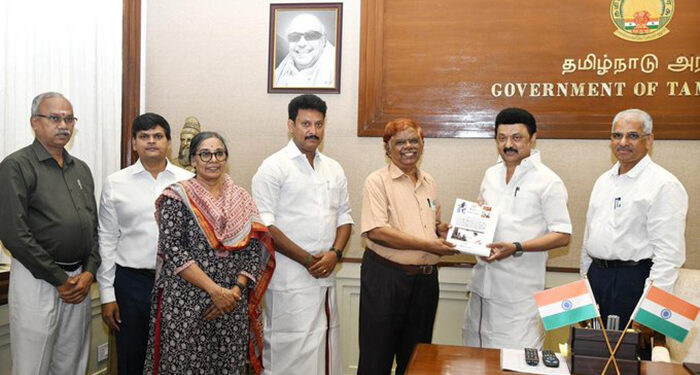NE NEWS SERVICE
CHENNAI, JUNE 19
‘சாதிகள் இல்லையடி பாப்பா… குலத் தாழ்ச்சி உயர்ச்சி சொல்லல் பாவம்’ என்றார் மகாகவி பாரதி. ஜாதி, மத பேதமின்றி அனைவரையும் சமமென கருத வேண்டும் என்றார் தந்தை பெரியார்.
(‘There is no caste baby…It is a sin to differentiate all on the basis of caste’, said National poet Subramania Bharathiyar. ‘All ought to be treated equally irrespective of their caste and religion,’ said Thanthai EVR Periyar.)
In a first of its kind in the country, under the Dravidian Model governance of visionary DMK chief and Tamil Nadu Chief Minister MK Stalin the state will bring about this transformation in the corridors of education right from the primary school to higher education institutes.
- Teachers and staff of schools and colleges must undergo compulsory orientation programs relating to social issues, caste discrimination, sexual violence, and offenses against SC/ST.
- Retired Madras High Court judge Justice K Chandru suggested that students should be prohibited from wearing any coloured wristbands, rings, or forehead marks (tilaka) that are caste markers
- An expert body or agency be appointed by the government to investigate allegations of saffronisation of education and activities that infiltrate educational institutions, hampering caste and communal harmony: Panel
- Reject the recommendations of Justice Chandru Committee report: BJP leader H. Raja
A committee constituted by the Tamil Nadu government to suggest measures to prevent caste-based discrimination and violence in education institutions submitted its report on Tuesday. Among the measures, the report recommends ban on coloured ornaments that are caste markers.
one-member committee, headed by retired Madras High Court judge Justice K Chandru was constituted after an incident at Tirunelveli in August 2023, where two school children belonging to the Scheduled Caste community in Tirunelveli’s Nanguneri were assaulted by their schoolmates over caste differences.
The committee suggested that students should be prohibited from wearing any coloured wristbands, rings, or forehead marks (tilaka) that are caste markers. The committee also recommended that students refrain from using bicycles painted with references to their caste or exhibiting any caste-related sentiments.
“Failure to comply with these rules must result in appropriate action being taken, in addition to advising their parents or guardians,” the committee report read.
Importantly, the committee proposed that seating arrangements of students in every classroom in all schools and colleges should be strictly based on alphabetical order.
Furthermore, it recommended that the attendance register of the students must not contain any column or details relating to their caste. Additionally, it advised teachers not to call out the students either directly or indirectly referring to their caste, nor make any derogatory remarks about the student’s caste or the so-called character attributed to the caste.
For schools, it suggested that the government mandate the removal of any caste prefix or suffix associated with government schools. This should apply to schools established in the future and those that already exist.
In the case of existing private schools with caste appellations, the school education department should request these schools to eliminate them.
It also proposed that the government bring appropriate regulations prohibiting the use of school/college auditoriums, classrooms, playgrounds, or open spaces for activities such as mass drills, parades, or the propagation of communal or caste-related messages.
Incidentally, the committee suggested that an expert body or agency be appointed by the government to investigate allegations of saffronisation of education and activities that infiltrate educational institutions, hampering caste and communal harmony.
As for teachers, the committee recommended the periodic transfer of high school and higher secondary school staff.
“Regarding the posting of officers from the cadre of CEOs, DEOs, BEOs, and Headmasters of high schools and higher secondary schools, guidelines must be issued concerning the non-posting of persons belonging to the dominant caste of that area,” the committee said.
At the time of recruitment of teachers, it proposed that the aptitude of the teachers, as well as their attitude towards social justice issues, must be ascertained. Additionally, teachers and staff of schools and colleges must undergo compulsory orientation programs relating to social issues, caste discrimination, sexual violence, and offenses against SC/ST.
As a long-term goal, the committee suggested that the Tamil Nadu government enact legislation governing all students from schools to higher educational institutions to enforce a policy of social inclusion and eradicate caste discrimination.
“This legislation should impose duties and responsibilities on students, teaching and non-teaching staff, as well as the management of such institutions, and prescribe mechanisms for supervision, control, and sanctions for non-compliance with these directives,” it said.
Reject the recommendations of Justice Chandru Committee report: BJP leader H. Raja
The BJP’s Tamil Nadu unit urged the DMK government to reject the report submitted by the one-man committee headed by retired Madras High Court judge Justice K. Chandru which has recommended that school students be banned from wearing wristbands or forehead marks that may indicate their caste. Talking to media after the core committee meeting, BJP Leader H Raja said, “The one-man committee headed by Justice Chandru was submitted to Chief Minister yesterday. The recommendations of the report target one particular religion. The state government should reject the report. People who spoke in favour of wearing hijab, are now recommending that Hindu women should not wear a mark on their forehead or religious bands on their hands. We believe that this is an evangelistic report.”












